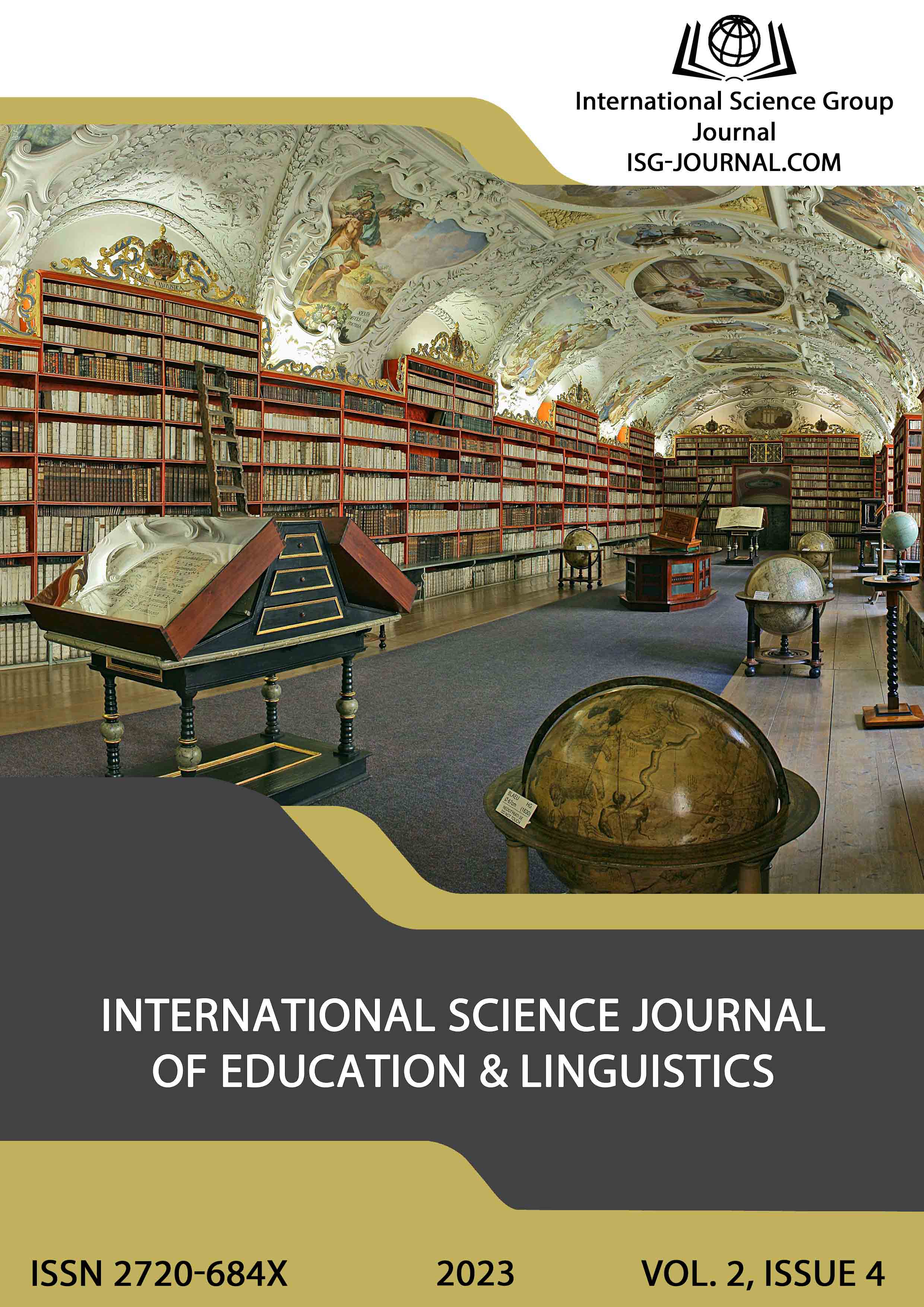Dialogical learning as a means of developing students' communicative skills in a specialized school
DOI:
https://doi.org/10.46299/j.isjel.20230204.03Keywords:
dialogical learning, communicative abilities, models and methods of learning, active forms of learning, pedagogical technologies, dialogue, communicationAbstract
The article is devoted to the study of the dialogic approach in the educational process. It is noted that the basis of modern methodical innovations is a systemic activity approach, which includes independent searching and reflective activity of students during the educational process, on the basis of which universal educational actions are formed. The main connecting element between the teacher and students in the conditions of modern education is educational dialogue, which, in turn, is considered not only as a method of working on the content of the lesson, but also as a form of organizing the educational process.The author examines the specifics of the dialogic approach, describes its principles and features. The article also presents various methods that can be used in the dialogic educational process, such as methods of interactive lessons, discussions, business game technologies, and other practices.In the article, based on the analysis of research results, conclusions are drawn regarding the interest of students in active forms of learning. It is noted that teaching models and methods should be focused on the dialogic nature of the relationship between students and the teacher. The effectiveness of dialogic educational process methods increases due to the fact that students begin to consider dialogue as a joint search for an answer to a given question.The author suggests using a dialogic approach as a basis for learning a foreign language, as it allows creating a communicative environment in which students can develop communication skills and improve their ability to understand a foreign language.It is emphasized that the dialogic educational process is an effective method of learning and personal development, which includes active interaction of participants, exchange of experiences, analysis and discussion of different points of view.In general, the topic of dialogic learning in foreign language lessons is important for improving the quality of language learning and developing students' communication skills. Research in this area can help teachers and researchers better understand the learning process and develop more effective methods and techniques to achieve this goal.
References
Козак, Н. І. (2018). Сучасні підходи до формування мотивації навчання. Педагогіка та психологія, 1 (14), 24-28.
Бондарчук, І. О. (2020). Індивідуальний підхід до навчання як передумова ефективності освітнього процесу. Освіта та розвиток beglobal, 2 (8), 11-16.
Діденко, О. А. (2019). Сучасні методики навчання та їх вплив на ефективність освітнього процесу. Освіта та розвиток, 3 (11), 19-23.
Рябоконь, І. О. (2012). Методи застосування ситуаційних вправ і ведення дискусії під час проведення практичних занять. Аудиторна робота викладача і студента: досвід і напрями вдосконалення : зб. матеріалів наук.- метод. конф. 21 лют. 2012 р.
Черниш, В. В. (2011). Засоби формування іншомовної комунікативної компетенції у діалогічному мовленні. Іноземні мов, 3. 15-22.
Черниш, В. В. (2012). Навчання іншомовного діалогічного мовлення в аспекті компетентнісного підходу. Іноземні мови, 4. 11-15.
Старобрянська, К. Я. (2009). Психологічні особливості навчання усного мовлення. Збірник наукових праць Хмельницького інституту соціальних технологій Університету Україна, 1, С. 95-97.
Dewey, J. (1929). The Quest for Certainty: A Study of the Relation of Knowledge and Action. Minton, Balch & Company.
Dewey, J. (1933). How We Think: A Restatement of the Relation of Reflective Thinking to the Educative Process. D.C. Heath and Company.
Зязюн, І. (2015). Формування комунікативної культури майбутніх педагогів у процесі діалогічного навчання. Інститут педагогіки НАПН України, 219.
Малишева, О. (2020). Діалогічне навчання як засіб розвитку критичного мислення учнів. Наукові праці. Педагогічні науки, 245, 128-134.
Кремень, В. (2017). Діалогічне навчання як засіб забезпечення розвитку критичного мислення учнів, підвищення їхньої мотивації до навчання та формування соціальних навичок. Вісник Київського національного університету імені Тараса Шевченка. Педагогіка, 2 (45), 39-44.
Ракова, М. (2018). Дослідження діалогічного навчання як засобу формування інтерактивності учнів. Науковий вісник: Педагогіка і психологія, 6 (23), 82-87.
Лук’янова, Л. (2019). Діалогічне навчання як засіб розвитку мовленнєвої культури учнів. Науковий часопис НПУ імені М.П. Драгоманова. Серія 16. Творча особистість учителя: проблеми теорії і практики, 29 (39), 48-52.
Корнієнко, С. (2016). Діалогічне навчання як засіб формування мовленнєвої компетенції та міжкультурної комунікативної компетенції учнів при вивченні іноземних мов. Науковий вісник Херсонського державного університету. Серія Педагогічні науки, (11), 28-31.
Бахтин, М. М. (1975). Проблемы речи и коммуникации в психологической науке. Москва: Радуга.
Fletcher, J. (2017). Dialogic Education: Mastering Core Concepts through Thinking Together. Abingdon, Oxon; New York, NY: Routledge.
Michaels, S. (2002). The Language of Life and Death: The Transformation of Experience in Oral Narrative. Cambridge, MA: Harvard University Press.
Mercer, N. (2008). Talk and the Development of Reasoning and Understanding. Human Development, 51(2), 90–100.
Holm, E. A. (2017). Dialogic Education: Talk and Transformation. Rotterdam: Sense Publishers.
Rock, M.-J. (2013). Les compétences dialogiques en débat: Le cas de la discussion dirigée en classe. Bruxelles: De Boeck Supérieur.
Kobern, M. (2014). Developing Dialogues: Indigenous and Ethnic Community Broadcasting in Australia. Bern: Peter Lang.
Downloads
Published
How to Cite
Issue
Section
License
Copyright (c) 2023 Альона Солодчук

This work is licensed under a Creative Commons Attribution 4.0 International License.





